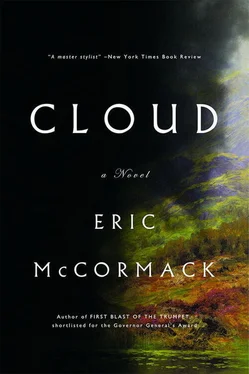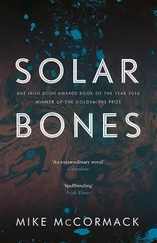I once asked her why she didn’t just tell him straight out and be done with it.
She shook her head vigorously.
“A dislike for music’s not something I care to admit to,” she said. That was as near as she ever came to acknowledging it might be a defect.
So, when Jonson brought his records along, she’d make an effort to maintain a polite interest in them. But the ecstasies of the divas and tenors that so delighted him were pure agony to her. Jonson’s image of father — daughter musical soirées was as much a charade as the perfect marriage she and I presented to the world.
I’D FREQUENTLY CATCH myself thinking how wonderful it might have been if I’d married Miriam Galt. But those moments of wishful imagining were a kind of sadism, one part of my mind tormenting another. I’d immediately try to make myself think about something else, and if that effort of will didn’t work I’d head out into the garden and mow the lawn or hack at the weeds. As a last resort, I’d even go up to the library and force myself to concentrate on some very technical article in the latest International Journal of Pumps .
On such occasions, I convinced myself that my self-discipline was necessary to avoiding madness. But I couldn’t stave off the doubts — that perhaps the real madness was my ongoing attempt to forget such an important episode from my past.
Anyway, I had no defence against my dreams. In one of the most persistent of them, I’d be tramping the purple hills of Duncairn on my way to Miriam’s house, my heart pounding in anticipation.
To awake from that dream, pounding heart and all, to my present reality was a refined form of torture.
In early March of Frank’s first year at university, I had to leave the snows of Camberloo behind and head for the southern hemisphere on business. Gordon had had to go there often, and had told me about the rigours of getting to Fiji in the old days — it involved, amongst other things, an arduous sea voyage of several weeks and the likelihood of spells of very rough weather. But for me now it was just a case of catching a trans-Pacific flight and emerging a few hours later into warm air scented with frangipani and who knows what other perfumes.
The major business of this particular trip was done in Suva, the capital of the main island, Viti Levu. I attended numerous meetings and sold six new pumps and a variety of parts to Consolidated Minerals, the biggest mining organization on the island. We’d been trying for years without success to interest them in our pumps, so all in all it was a very satisfying piece of work.
But I didn’t head home right away.
Some weeks before I left Camberloo, Jonson had received a letter from the manager of a phosphate company on Bird Island, one of the islands of the Oluban chain in the vicinity of Fiji. The gist of the letter was that Gordon, twenty-five years ago, had sold the company two pumps used in the phosphate-extraction process. The pumps were now wearing out. Records of the sale had been found by the present manager at Bird Island and he’d decided to get in touch with Smith’s Pumps and inquire about possible replacements or repairs.
Jonson had shown me the letter and we’d decided I should make a side trip from Fiji. The Bird Island manager and his engineer agreed to come and meet me on the main island, Oluba.
So, after the Fijian business was settled, I set out on an inter-island schooner headed southwards for the Oluban Archipelago, a scattering of volcanic islands and coral atolls spread across three hundred miles of ocean. On the map, the chain of islands looked like some half-immersed monster, with the main island — Oluba itself — being the monster’s head. I remembered how Gordon had mentioned the island to me several times, and remarked on how kind the people had been to him.
During the long day and overnight sail on the inter-island schooner, I once more suffered from the curse of seasickness. At dawn, I couldn’t stand the nausea anymore and stumbled out of my cabin onto the deck to gulp in the fresh air. I noticed that what had been a smudge on the horizon the night before had turned itself into an island.
I managed, without vomiting, to ask a sailor who was coiling a line near me on deck if we were near our destination.
“Yes,” he said. “That’s Oluba, the main island, off the bow. The women there have tattoos and strong legs.”
That was a curious remark. But I was feeling too sorry for myself to ask what he meant.
OLUBA WASN’T QUITE as near as it had seemed at dawn. In fact, my watch showed four-thirty in the afternoon as the schooner hurtled through the narrow opening in the reef into the smooth waters of the lagoon. At the same time, magically, I lost my desire to vomit and even took enough interest in my surroundings to notice a few dozen sailing ships at anchor as well as some freighters. A luxurious-looking motor yacht was moored at the same dock where our schooner tied up. Several islanders began helping our crew with the discharging of various crates and other cargo.
Dusk was already falling as I set out, bag in hand, for my hotel. I was a happy man to be on dry land again.
From what I could see, Oluba was a typical native village along a beach. It consisted of one main street and a sizable dock that protruded into the lagoon. There were the usual structures — a church, several stores with colourful signs above them, and a post office — all of them built with bamboo and other local woods. The houses had grass roofs and walls flimsy enough to let the fresh air blow through. Toilet facilities for the most part consisted of dilapidated outhouses perched over the tidal waters.
At the end of the street, I came to a hotel with an especially large sign— The Mango Tree Hotel . According to Gordon’s records, this was where he’d always stayed when he was here. The sandy compound contained a number of bamboo huts, dominated by a main building with a woven grass roof. I made my way inside it.
Behind the check-in desk sat a woman in a blue smock with long sleeves. In the light of the overhead lamps — the hotel obviously had its own generator — the skin of her face and neck looked so damaged I thought at first she’d been in some awful accident. Then I realized the blemishes were, in fact, ornate tattoos of grasses and flowers and vines.
That brought to mind the comment of the sailor on deck, earlier that morning, about the women here. I’d never seen anyone, in all my travels, tattooed to this extent. The camouflage effect made it hard to tell her age accurately, though I guessed she was in her twenties. She had a friendly demeanour but spoke no English, not even pidgin, so we communicated in sign language. Finally she gave me a little card with the number of the hut that had been allocated to me. Written on it in several languages was the information that dinner would be served at seven. I wrote my name and business in the register and headed for my hut.
It turned out to be at the rear of the main building and had a lagoon view. The bamboo walls were painted white and the floor was covered by a rattan carpet. There was a large bed, a desk and chair, and a wardrobe. I was most pleased by the fact that the hut also had a shower and an indoor toilet.
The bedside lamp highlighted an odd feature of the room. Running above the whole length of the bed was a rounded, hardwood beam supported by posts. A flimsy mosquito net hung from that beam, which seemed to me somewhat excessive for the purpose.
After a shower to wash the salt of the voyage off my body, I put on fresh clothes and went back to the main building. To get to the dining room I had to pass through a well-stocked bar, where I ordered a scotch from the bartender, a slow-moving, bald man of about sixty. He wasn’t an islander, though he did wear the traditional waist cloth. A plain white shirt bulged over his sizable belly.
Читать дальше











